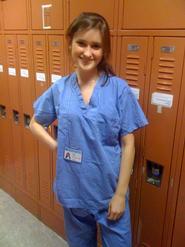
Although she was standing only two feet away in the operating room, Caitlin Williams ’11 was unable to see to the bottom of the large hole carved in the patient's brain. Using a technique called frontal craniotomy, the surgeon was removing a three-inch section that contained a massive tumor. The procedure made an impression on Williams, who is interning this summer for the Neurological Institute of Columbia-Presbyterian Hospital. “It truly affirmed my love of medicine and my passion to be a doctor,” she said.
The hospital is located on West 168th Street in Manhattan and is affiliated with the Columbia University Medical Center. Williams’ internship is in the neurovascular lab. She is currently engaged in a Columbia medical student’s grant project, which centers on the mortality and morbidity rates of whites and non-whites who have undergone carotid endarterectomies (surgical procedures used to prevent strokes). They are using a national database that stores information on every patient admitted to 20 percent of the nation’s hospitals. Williams has become proficient in understanding statistical analysis and hopes that her research will help doctors make more competent decisions regarding standards and expectations for each patient.
But besides learning new things, Williams is taking advantage of the opportunity to apply what she has already learned in classes like Introduction to Brain and Behavior with Stone Professor of Psychology Douglas Weldon.
“It’s one thing to learn how one hormone affects another, or where the sensory-motor cortex is, but there is nothing that compares to seeing these things in action, working in an actual human being,” she noted.
Because the internship is not a paid position, Williams sought funds that would replace the money she would normally make at a regular job over the summer. She applied for and received the Jeffery Fund for Science Internships, which supports full-time, off-campus internships related to science.
After Hamilton, Williams says she would love to work with children and will strive for a degree in pediatric neurology. At her job, she sees much interaction between children and their doctors. One day, she met a developmental psychologist who was working with two children; one of them appeared to have a verbal communication deficit. To make matters worse, the child only knew how to speak Spanish. Because there was a sharp language barrier between mother, child, and doctor, Williams tried to recall some of her high school Spanish in order to communicate and play with the boy. The result 45 minutes later was astounding.
“He suddenly began to attempt to formulate words, something that was very rare for him,” Williams said. “It appeared that once I got him to speak, he didn’t want to stop. Of course, I didn’t fix him, but just hearing those few words come out of his mouth gave me hope for this very intelligent child. It was one of the most rewarding experiences that I have ever had.”
The hospital is located on West 168th Street in Manhattan and is affiliated with the Columbia University Medical Center. Williams’ internship is in the neurovascular lab. She is currently engaged in a Columbia medical student’s grant project, which centers on the mortality and morbidity rates of whites and non-whites who have undergone carotid endarterectomies (surgical procedures used to prevent strokes). They are using a national database that stores information on every patient admitted to 20 percent of the nation’s hospitals. Williams has become proficient in understanding statistical analysis and hopes that her research will help doctors make more competent decisions regarding standards and expectations for each patient.
But besides learning new things, Williams is taking advantage of the opportunity to apply what she has already learned in classes like Introduction to Brain and Behavior with Stone Professor of Psychology Douglas Weldon.
“It’s one thing to learn how one hormone affects another, or where the sensory-motor cortex is, but there is nothing that compares to seeing these things in action, working in an actual human being,” she noted.
Because the internship is not a paid position, Williams sought funds that would replace the money she would normally make at a regular job over the summer. She applied for and received the Jeffery Fund for Science Internships, which supports full-time, off-campus internships related to science.
After Hamilton, Williams says she would love to work with children and will strive for a degree in pediatric neurology. At her job, she sees much interaction between children and their doctors. One day, she met a developmental psychologist who was working with two children; one of them appeared to have a verbal communication deficit. To make matters worse, the child only knew how to speak Spanish. Because there was a sharp language barrier between mother, child, and doctor, Williams tried to recall some of her high school Spanish in order to communicate and play with the boy. The result 45 minutes later was astounding.
“He suddenly began to attempt to formulate words, something that was very rare for him,” Williams said. “It appeared that once I got him to speak, he didn’t want to stop. Of course, I didn’t fix him, but just hearing those few words come out of his mouth gave me hope for this very intelligent child. It was one of the most rewarding experiences that I have ever had.”
Posted July 30, 2009
